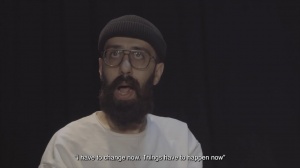Performance by The Freedon Theatre in Jenin 2024.
As part of the public programming for Al-Haq FAI Unit's first exhibition, "They Are Shooting At Our Shadows", held at the Institute for the Arts and Sciences at the University of California, Santa Cruz, we collaborated with The Freedom Theatre. Together, we sought to explore a reality that is both enduring and elusive—a reality shaped by the relentless disruption of life in Jenin.
In Jenin, Israeli raids surgically displace the rhythm of ordinary life, fragmenting steady routines into scattered memories. Daily rituals, once anchoring and familiar, dissolve into an uneasy waiting, as existence teeters between what was and what might no longer be. Life becomes a delicate balance, always on the verge of being overturned.
The camp in Jenin is still steeped in the lingering shadows of 2002. The scars of that time remain etched into its streets, its homes, and the memories of its people. Many who speak today were children then, standing on the periphery, watching bulldozers flatten homes, roads, and playgrounds. They grew up carrying these images, only to find themselves, in 2023, witnessing a hauntingly similar scene. It is as if time itself has folded, delivering them back to the moment when they first felt the unrelenting pain of occupation. The Israeli occupation wields time as its weapon, trapping Palestinians in an endless cycle of return—repeatedly thrusting them into the same moments of loss and devastation.
But this violence extends beyond time and space; it carves itself into the bodies and imaginations of Palestinians. It confiscates even the possibility of a quiet day—a day when one might complete simple chores that have lingered too long on a mental to-do list. A broken window cannot be fixed without an argument with the repairman, who insists it’s a waste of money. “In two or three days,” he says, “the next raid will break it again.” Such conversations reveal a deeper truth: life here is suspended, perpetually unfinished, caught in the grip of an unrelenting force.
Since the Nakba of 1948, Israel has succeeded in denying Palestinians a steady sense of life. Space is not truly their own, and time, too, has been stolen. The Nakba is not only a story of displacement but also of fragmentation—a deliberate fracturing of Palestinian existence. Palestinians have been forced into isolated geopolitical enclaves, hemmed in by gates, checkpoints, and walls. These divisions have profoundly distorted the collective sense of identity, leaving communities fragmented and disconnected.
And yet, imagination endures as the Palestinians’ most powerful tool. It rises above the sea of Israeli control and surveillance, filling the fractured landscape with images of what might yet be—a Palestine that is whole, a world where justice prevails. It is an imagination that envisions a life where a broken window is mended not by an armored bulldozer’s wake but by a neighbor’s child, whose stray football shattered it during a game. In this imagined world, the weight of occupation gives way to the simple, grounding acts of ordinary life—acts that restore not just windows but a shared sense of belonging.
For more information on the work of the unit, contact the following email: [email protected]


